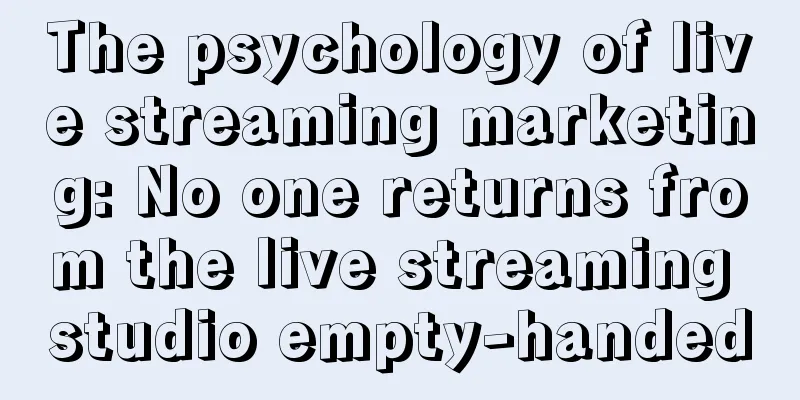The psychology of live streaming marketing: No one returns from the live streaming studio empty-handed

"No one can return empty-handed from Li Jiaqi's live broadcast room." This statement is not a joke. Li Jiaqi's live broadcast room has many products, the prices are cheap, and the host's live broadcast is attractive, so people who watch the live broadcast in its entirety will buy a few items. "3, 2, 1, link up." "Dear darlings, please hurry up and take pictures, there are only x pieces left!" "The product originally priced at xx yuan is only xx yuan in my live broadcast room today, and you will get xx yuan for free when you place an order, which is like buy one get two free. What are you waiting for, babies?" "Send it again, send it again, I will send it again..." These live broadcast scripts are an important driving force for viewers to buy products. Although these live broadcast scripts may seem simple, they contain the psychology that guides viewers to buy products. This article will delve into the psychology theories and techniques commonly used in live streaming sales to help you better understand the appeal of this marketing method. 1. Algorithms allow you to buy live streaming products without making a fussLivestreaming has actually existed since the traditional media era, but its scale and influence were far less than they are today. The fundamental reason why livestreaming makes people buy in the algorithm era is closely related to accurate recommendations. The underlying psychological principle of algorithm-driven livestreaming is "subconscious induction." In the book "What Kind of Advertising Are We Paying For", Robert Heath summarizes several advertising and marketing models, the most important of which are the following two. The first is the persuasion model : This is the most common and traditional advertising model, which believes that the purpose of advertising is to persuade consumers to buy products or services through strong arguments and evidence. This model emphasizes the rationality and logic of advertising. The second is the subconscious induction model : This is an advertising model based on psychological research, which believes that the purpose of advertising is to establish an emotional connection between the brand and the consumer by influencing the consumer's subconscious mind. This model emphasizes the emotion and peripheral exposure of the advertisement, but does not require consumers to have a high level of attention or memory. The second model is also the core idea of this book. For live streaming in the algorithm era, its operating mechanism is to let the algorithm recommend you a brand-related content or advertisement first, and then increase the recommendation of related content after you are interested. When this content forms a certain impression or even preference in the consumer's mind, he or she may happen to see the live broadcast of related brands, and finally place an order under the clever arrangement of people, goods and venue in the live broadcast room. In the era of algorithms, the persuasive model of the anchor talking about how good his products are during live streaming does not play a key role. What is more crucial is that the related content recommended to him by the algorithm before the live streaming has already formed an implicit influence on him, and live streaming is just the final finishing touch. Compared with traditional advertising, algorithm-recommended content and advertisements are faster and more efficient. Traditional advertising usually takes at least months to have an impact on consumers, while algorithm-recommended content and advertisements only take days to have an impact on consumers. Therefore, the premise of the psychology of live streaming sales is the subconscious induction model. Of course, in the specific live streaming room, the marketing psychology of people, goods, and places also plays a role. 2. People: The emotional transfer effect of anchorsIn the era of traditional media, many products use celebrities to advertise, which can often quickly increase their popularity and promote sales. When a consumer likes a celebrity, he or she will often buy the product endorsed by the celebrity. From a psychological perspective, celebrities use the emotional transfer effect when advertising products. Emotional transfer means that people transfer their emotions towards a certain person or thing to another person or thing related to it. During live streaming sales, anchors will use external factors such as their image, voice, temperament, knowledge, etc. to make consumers feel good and trust them, which in turn will make consumers feel good and trust the products they recommend, and increase consumers' motivation and willingness to buy. In addition to making consumers "love the house and the dog" through emotional transfer, anchors often like to use labels in live broadcasts, such as "Viya's woman", "Li Jiaqi's fairy", "Genghong girl", etc. These labels can make consumers think of themselves as such people, making them feel a sense of belonging and identity. This actually utilizes the social labeling theory, which holds that when people face others, they will give them specific social labels and treat them according to these labels. In live streaming sales, anchors introduce social labels to products or users, such as defining their own audience as "XX anchor's girls" and labeling products as "the same as celebrities'" or "the same as internet celebrities'". When consumers identify themselves with these labels, they find themselves in an unfavorable situation. If other consumers with the same label buy the product, then they must buy it too. Otherwise, they will feel that they are out of the group. This label creates invisible pressure on consumers to buy. 3. Goods - Why do you always buy things in the live broadcast room?Products are the most core element of a live broadcast room. The key to the sales of a live broadcast room lies in whether its products are good enough and whether they are discounted enough. In this regard, live broadcasting has taken the psychology of product sales to the extreme. 1. Why do you like to stock up on goods during live streaming?Stockpiling is connected to people’s dopamine. Dopamine is always focused on getting more, on the future, and one of its important jobs is to act as an early warning system, alerting us to anything that could help us survive in the future. Daniel Lieberman, author of "Greedy Dopamine," said it's "like an old lady who's always buying toilet paper, even if there are a thousand rolls piled up in the pantry. Her attitude is, 'You can never have too much toilet paper.'" When you see someone selling daily necessities at a favorable price in a live broadcast room, dopamine will drive you to place an order. You feel that if you don’t stock up more at this time, you will spend more money in the future. Stocking up in the live broadcast room gives you a sense of security. 2. Why are the products in the live broadcast room so cheap?One of the important reasons why people go to live broadcast rooms to buy goods is that the goods in the live broadcast rooms are cheap. Most of the time, it is because the anchors have strong bargaining power. Because the anchors sell large volumes of goods and can obtain brand effects, they can get a large number of goods at low prices. For consumers, when they see a product for the first time, it is difficult for them to judge whether the product is discounted or not. This is when the anchoring effect comes into play. The anchoring effect refers to the fact that when people make decisions, they will be influenced by the first information or number given, which will affect subsequent judgments. In live streaming, the anchor will first give a very high original price, and then give a very low discounted price. The usual rhetoric is: This product is originally priced at 298 yuan, but it only costs 98 yuan in my live streaming room. If you buy it today, you will also get XX worth 99 yuan. XX, which originally costs 299 yuan, will be given away immediately if you place an order today. What are you waiting for? Here, consumers will use the original price as a reference point, thinking that the discounted price is much cheaper than the original price. Coupled with the addition of gifts and the host’s explanation with a strong sense of urgency, consumers will easily place an order. 3. Why are there always so many gifts during live broadcasts?"Give me more, give me more, I'll give me more..." This is a common phrase used by many anchors. Why do anchors love to give out gifts during live broadcasts? Don't gifts cost money? Giving gifts is related to two psychological principles. The first is the value-added effect, which means that in the minds of consumers, gifts are seen as increasing the value of the product. When consumers buy products, the anchor gives gifts to make them feel that they have received extra value, thus generating a higher sense of satisfaction and recognition of the product. For example, when a consumer buys a product worth 100 yuan, and the anchor gives him a gift worth 20 yuan, the consumer will not feel that he has saved 20 yuan by buying the product, but will feel that he has earned an extra 20 yuan. Note that these two methods are completely different. When there is a gift, the consumer's psychological activity is: I need to buy something anyway, and I can earn 20 yuan by buying this thing, so why don't I buy it? In fact, most of the time, the value of the gifts is very low. They are not sold in themselves, but are specially produced to encourage consumers to buy genuine products. The second is the principle of reciprocity, which means that after people receive favors or help from others, they will feel an obligation or responsibility to repay others. In live streaming, when the anchor gives out some gifts, consumers will feel that the anchor is generous and that they have received favors from the anchor. In order to repay this favor, they often buy more things. One case I have seen is this: VIVO's live broadcast of selling goods once selected two experts, A and B. Expert A was inferior to expert B in terms of the number of fans, the amount of sound waves received, and the total number of viewers. However, when selling goods, he added a gift - a sweeping robot, and finally exceeded the latter in terms of sales volume by 68%. 4. Why are the goods in the live broadcast room sold out in just a few seconds?"Dear babies, please hurry up and buy, there are only x pieces left!" Consumers often hear this phrase in the live broadcast room, which is of course a kind of hunger marketing. Since the birth of Xiaomi's hunger marketing, this marketing method has been learned and imitated by many brands. The subtext of hunger marketing is that the product is in high demand but the stock is insufficient. If you want to buy it, you have to act quickly, otherwise the product will be snatched away by others. "The product has been bought by someone else", this anxiety dominates many consumers. In the book Fight Anxiety and Accept Yourself, a woman said that she was always worried that if she didn't go shopping, she would miss something. “I always feel like everyone is buying things except me,” she said. “So every time there is a sale at the mall, I get really anxious because I feel like if I don’t go, I’ll miss out on the good prices, and then I get upset. And I’m always thinking about the discounted clothes. The clothes that fit my body shape very well may be bought by others very quickly, so I have to leave immediately. If I don’t leave, I will be driven crazy by this anxiety.” This exploits consumers' loss aversion, which means that when people face the same amount of gains and losses, they find the losses more unbearable. Products sold through live streaming always create a sense of urgency: this product is at the lowest price in XX days, and it also comes with XX kinds of gifts. Time is limited, 3, 2, 1, go to the link, hurry up and grab it, otherwise the product will be bought by someone else. At this time, your psychological activities are often like this: the quantity of goods is limited, if I don’t buy it, someone else will. Besides, so many people have started to rush to buy the goods, if I still don’t, wouldn’t I be stupid? 4. Field - the rush purchase field in the live broadcast roomIn my opinion, the live broadcast room creates a field through the host’s commentary, performance, and the combination of products. Just like a magnetic field that attracts metals, the live broadcast room creates a shopping scene that attracts consumers to buy things. A live broadcast room always tries every possible means to design various environments to provide consumers with the most suitable purchasing scenarios. Different music can cause different emotional responses in consumers, thus affecting their feelings about products and purchasing decisions. For example, fast-paced, passionate music can make consumers feel excited and enthusiastic, and is suitable for live broadcasts of sports products such as sports shoes and fitness equipment. Soft, soothing music is more suitable for live broadcasts of female consumer products such as beauty and skin care. T97 Coffee uses a unique fast-paced Rap style to encourage consumers to quickly place orders for low-priced goods such as coffee. Ever since Herborist became popular with its Qing Palace style, many anchors have set up live broadcast rooms with various themes and corresponding cosplay. They aim to create a scene that best suits the product to allow consumers to shop immersively. Many consumers are so immersed in the plot that they place orders without realizing it. Decoration, clothing, music, etc. certainly provide consumers with an experience that is more suitable for placing orders, but the essence of live streaming sales is to create an environment for irrational consumption, which takes advantage of the classic herd mentality. Le Bon, the author of The Crowd, believes that when a group of people act collectively, they will form a "group psychology" in which the individual's will and behavior will be influenced and dominated by the group. In this case, the individual's rationality and judgment will be weakened, and they will be easily influenced by emotions and enthusiasm, thus making decisions that are different from their personal judgment. In a live broadcast room with a large number of people, the audience actually forms a group that influences each other. When consumers see the host recommend a certain product and see other viewers expressing in the comment area that they have already bought it or plan to buy it, they will think that this product is very popular and will be more inclined to buy it. When the atmosphere created by the anchor in the live broadcast room reaches its climax, irrational ordering behavior will occur. Some people will buy goods that they don’t need at all, some people will buy goods that are priced higher than usual, and some people will buy defective goods. V. ConclusionIn live streaming sales, the three elements of people, goods and venue all play a vital role, and psychology also plays an important role in each element. From a human perspective, live streaming e-commerce establishes emotional connections and social recognition with consumers by selecting hosts with professional knowledge, trust, affinity and influence, thereby stimulating consumers' desire to buy. From the perspective of goods, live streaming satisfies consumers’ needs and expectations by showcasing the quality, functions, discounts and other characteristics of goods, increases the sense of value and scarcity of goods, and promotes consumer decision-making. From the perspective of the scene, live streaming sales creates an interesting, interactive, and tense live streaming environment to mobilize consumers' attention and emotions, and use the herd mentality to guide consumers to make quick purchases. Through in-depth research on consumer psychology and scientific application of marketing strategies, live streaming will become a more effective sales method in the future. Author: Xunkong WeChat public account: Xunkong’s Marketing Revelation (ID: xunkong2005) |
<<: Lululemon, L'Oreal, and Adidas all set up stalls. What happened to the big-brand marketing?
Recommend
The new logic of WeChat public account traffic: the increase of followers is on the left, and the traffic is on the right
WeChat has been adjusting its functions recently. ...
The top ten most popular IPs in 2022!
Unconsciously, 2023 has been here for a week, but ...
Do products on Shopee need to be certified? How to list them?
Whether you are operating a Taobao store or a Shop...
How to check Amazon's express delivery tracking number? How does Amazon operate?
The development of the Amazon platform is getting ...
Station B terminates its decision to completely cancel the display of playback data
Yesterday, Bilibili announced the termination of i...
What should I do if Amazon delivers goods during the Spring Festival? How should I handle it?
Now that the Chinese New Year is coming soon on Am...
Standing next to the boss for a long time, you will be the second
What should companies do in the face of fierce com...
Building an anti-fragile growth model, the global content system of consumer goods and the second growth curve
In today's highly competitive consumer goods m...
Where are Shopee's overseas warehouses? What are the advantages of overseas warehouses?
Today, I will introduce you to Shopee's overse...
What is Shopee Live? What is it used for?
Nowadays, whether it is the media or e-commerce, e...
6 recent favorite cases
This article brings together the creative marketi...
Can Amazon shipping fees be set differently? How to calculate the cost?
We all know that when you send express mail, the c...
48,000 followers, advertising price of 12,000: Chinese health care "supports" post-95 bloggers
As the pressure on young people increases, sub-hea...
How long does it take for Amazon to restore my appeal? How do I file an appeal on Amazon?
When opening a store on Amazon, you must abide by ...
Mixue Bingcheng: The Haagen-Dazs of Southeast Asia!
Snow King has come step by step to where it is tod...









